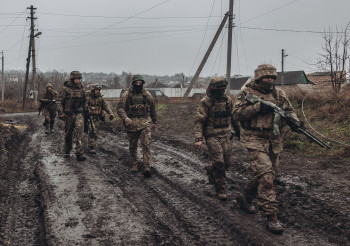Estonia's Intelligence Chief Margo Grosberg believes that Russia is about to announce a new mobilization drive after the Jan. 7 Orthodox Christmas holiday. However, Grosberg said that since the first wave in the fall, mobilization in Russia has never actually stopped.
About 300,000 Russian men have already been conscripted and are already being deployed to the front lines. If the second wave sees comparable results, the new conscripts should arrive in Ukraine by March or April.
Grosberg added that the Kremlin's said order of a ceasefire over the Orthodox Christmas weekend is most likely a psychological operation. Both Kyiv and the West met Russian President Vladimir Putin's offer with skepticism, seeing it as an opportunity for Russia to regroup.
Russia's mobilization drive was chaotic and unpopular, with hundreds of thousands of men fleeing the country to escape it. Shortages of training, equipment, and morale will limit the effectiveness of conscripts on the battlefield, according to the Center for Defense Strategies, a Ukrainian think tank.











